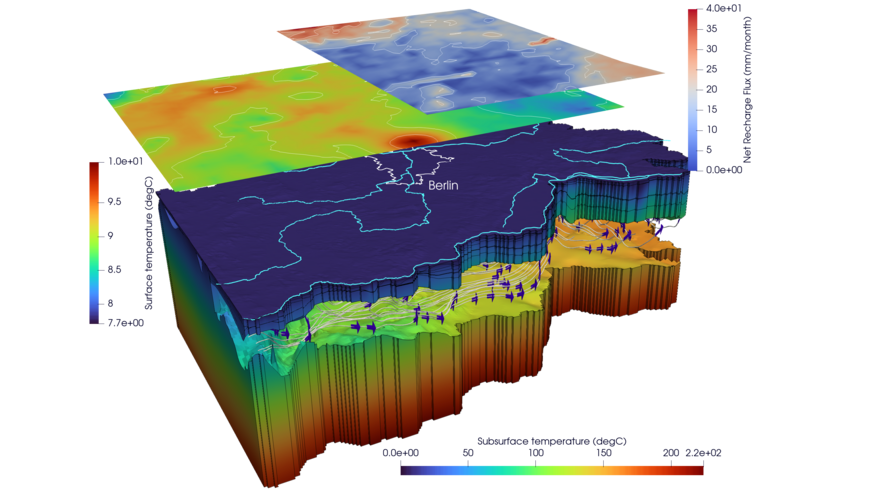Effects of Climate Change on Regional Groundwater Dynamics: An Example from Brandenburg
In this project, our objective is to quantify how climate-driven forces (i.e. precipitation and temperature), basin-scale geology, and topographic gradient interact to modify the regional groundwater flow and the subsurface thermal field. To achieve this, we look at the North German Basin beneath Brandenburg (NE Germany), which serves as an example of a porous aquifer system with a shallow-lying water table under a humid continental climate.
Brandenburg is one of the driest federal states in Germany, characterized by a negative and declining climatic water balance and consequently low groundwater recharge. The annual mean surface temperature has increased by ~1°C over the past 60 years, with recent evidence of rising temperatures at the groundwater table. Precipitation amount exhibits high annual variability, with a 20% increase in winter precipitation, and an expected rise in the frequency of extreme precipitation events and extended periods of drought. The majority of groundwater observation wells showcase a decrease in water level at 1-3 cm/year since 1970s. Though further changes in atmospheric temperature and precipitation patterns are expected to put additional stress on the availability of groundwater resources in the region, such effects remain to be quantified.
The complex feedback between the climate and shallow-to-deep subsurface processes is assessed via thermo-hydraulic simulations of the coupled surface-groundwater hydrological model of Brandenburg using GOLEM, a parallel scalable high-performance simulator.
We reconstruct present-date groundwater levels and aquifer temperatures by using monthly recharge estimations and recorded air temperatures for the past 60 years as boundary conditions. We then validate model outputs against time-series data from observation wells. The model derivatives are examined to describe the system’s feedback to meteoric water input. Finally, the calibrated current conditions serve as the input for a predictive model to forecast the system evolution with respect to climate scenarios.
This project supports the ongoing efforts to understand the role of anthropogenic and natural factors in water scarcity in Brandenburg and develop tools for groundwater resource management. Additionally, it aims to provide insights into the evolution of the subsurface thermal field, which is the focus of shallow and deep geothermal exploration in the North German Basin.
Collaborators:
Björn Guse (Christian-Albrecht University of Kiel)
Andreas Güntner (GFZ, Section 4.4 - Hydrology)
Publication:
Tsypin, M., Cacace, M., Scheck-Wenderoth, M. (2023): Data-driven thermo-hydraulic subsurface model of Brandenburg (NE Germany): a tool for assessing anthropogenic impact on regional groundwater dynamics, XXVIII General Assembly of the International Union of Geodesy and Geophysics (IUGG) (Berlin 2023).
https://doi.org/10.57757/IUGG23-1434





